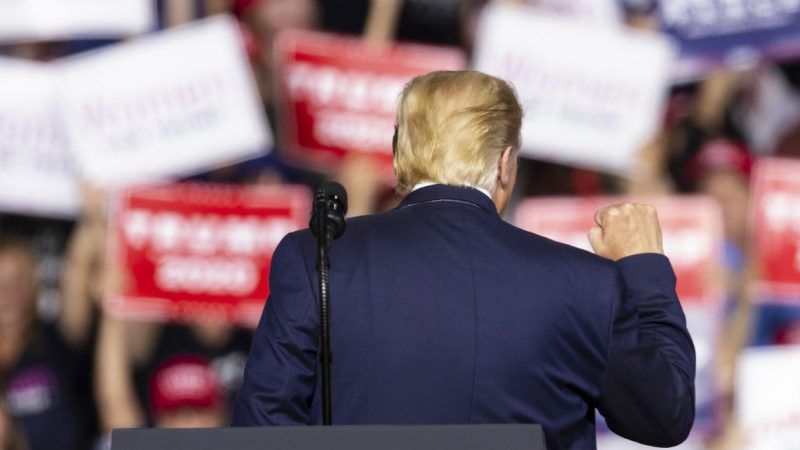Trump's Failed Impeachment Is Still Worth It
It at least sends a message against future abuses of executive power.

Everyone knows President Donald Trump will not be convicted in his impeachment trial. His party controls 53 seats of the Senate, so there is simply no way the requisite two-thirds will vote against him.
So is there any point to this whole exercise? Yes, there is. Impeachment is not just about this president; it is about future presidents. If Congress fails to act despite mounting evidence of Trump's abuses of office, it would hand presidents a license for misconduct.
Unfortunately, all presidents bend the rules and push the outer boundaries of their powers to achieve their preferred policy outcomes. But Trump didn't just bend the rules; he trashed the rulebook. Moreover, he did so to advance not any policy objective, but his own political interest.
The rough transcript of the call that Trump made to Ukrainian President Volodymyr Zelensky (the call that Trump insists was "perfect") offers compelling evidence that Trump demanded dirt on former Vice President Joe Biden as a condition for releasing congressionally authorized security aid to the country. In the call, Trump first berated Ukraine for not sufficiently "reciprocating" to "all the good" that America does for his country. Then he explicitly asked Zelensky to work with former New York Mayor Rudy Guiliani, Trump's personal lawyer, to launch a corruption investigation into how Biden's son landed a lucrative job at a Ukrainian energy company. Shortly after this call, the administration froze $391 million in congressionally authorized military aid to Ukraine. The Government Accountability Office recently ruled that this action violated the Impoundment Control Act, a law passed in the wake of Watergate precisely to stop presidents from substituting their own funding judgment for Congress'.
How could Trump possibly have thought withholding aid was appropriate—especially since he had just extricated himself from hot waters over his campaign's alleged collusion with Russia against Hillary Clinton? As Gordon Sondland, Trump's handpicked envoy to the European Union, explained to Bill Taylor, America's top diplomat to Ukraine at the time, Trump is a businessman and "when a businessman is about to sign a check to someone who owes him something, the businessman asks that person to pay up." In other words, as far as Trump was concerned, the aid belonged not to American taxpayers but him and he was entitled to use it as a personal slush fund to enlist a U.S. ally in oppo research.
This is generally the kind of thinking one expects from Third World potentates (or Detroit mayors). If a CEO used company funds for personal purposes, he'd be fired in a heartbeat.
So why does Trump deserve a pass? Trump's lawyers argue that he didn't violate any criminal laws and that the articles of impeachment drafted by the House don't accuse him of doing so. The articles merely charge Trump with abuse of power (and obstruction of Congress), a nebulous and subjective charge. But criminal conduct has never been a requirement for impeachment. Even the Georgetown law professor Jonathan Turley, one of the few legal experts outside of Trump's legal team who is on his side, accepts this.
In fact, when the Founders wrote the impeachment language in 1787, virtually no federal criminal laws even existed. If they still made provisions for impeachment, it is because they realized that in America's presidential system, the executive is granted powers that he or she may be tempted to abuse for all kinds of reasons. Trying to anticipate all the possible ways and write laws against them was neither possible nor desirable, so the Founders gave Congress the space to make subjective calls. To avoid partisan witch-hunts, they also set the two-third Senate vote bar to remove him from office.
Since then, executive power has grown in leaps and bounds, partly because Congress has not stepped in to prevent presidents from usurping its powers and partly because it has handed its powers to them on a platter. Yet the bar for removal has not been lowered. The upshot is that the president is becoming ever more powerful and ever less accountable.
In an ideal world, Congress would limit executive power or lower the bar for removal or both. But since that'll require the ghosts of the Founders to wake up and once again lead the country, the only nominal check on future abuses are impeachment proceedings that embarrass sitting presidents by exposing their wrongdoings even if they don't succeed in removing him from office. Trump is shameless, but even he is upset that the impeachment will look "bad" on his "resume." Most normally constituted presidents are likely to care quite a bit more about their honor.
Indeed, if Trump is able to get away with using his diplomatic and foreign policy powers to "screw [his] political enemies"—to use the immortal words of John Dean—what's to prevent him or future presidents from using their domestic powers for similar purposes? What would stop them from, say, withholding authorized disaster aid from governors till they deliver dirt on opponents? There are no criminal statutes against such behavior either, after all.
It would be nice if Trump's acquittal weren't preordained, given that, as Fox News' Judge Napolitano has pointed out, there is "ample and uncontradicted" evidence to support his removal.
But doing nothing in the face of his actions would lower the cost of bad behavior so much that even men and women better than Trump would be tempted toward behavior worse than Trump's. Power corrupts, and absolute power corrupts absolutely.
It is sad that an unsuccessful impeachment is one of the few tools left to the republic to stop the absolute corruptibility of the presidency. But it is better than nothing.
A version of this column originally appeared in The Week.


Show Comments (141)